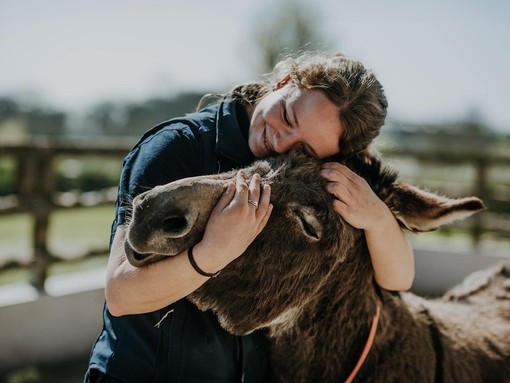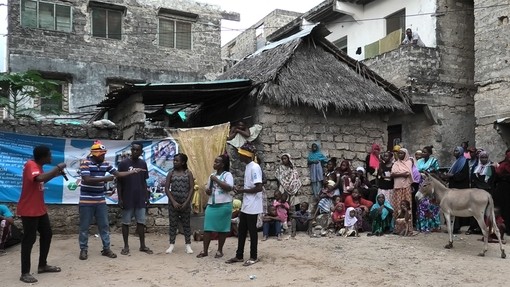
Janneke's day in a life
This is a transcript of Janneke’s “Day in the Life” vlog.
Can you tell us more about the United for Wildlife Global Summit?
This is the third year running that The Donkey Sanctuary has attended the United for Wildlife Global Summit as a partner and it is so crucial that we do. There are proven links between the global trade in donkey skins and the illegal wildlife trade. It’s not just conservationists that attend this summit – there are government representatives, law enforcement agencies, academics, financial institutions and the global transport sector – all people and organisations that have the potential to disrupt part of the donkey skin trade supply chain. The Donkey Sanctuary being here allows us to raise awareness and gain crucial partners and allies in the fight to stop the slaughter of donkeys for their skins.
During the summit we heard some amazing speakers talking about the latest innovations in fighting wildlife crime, ranging from finance tracking to the harsh realities that rangers face on the ground every day. What was really inspiring was to hear everyone agree that collaboration is the key to protecting our natural world. And what was particularly encouraging for me was to see the difference, after three years of the Donkey Sanctuary’s presence at this summit, in the awareness of the donkey skin trade. Previously, it wasn’t entirely obvious why an organisation dedicated to a domesticated species was present in the wildlife forum, but this year I could see that people really got it and there was so much enthusiasm for helping us.
Why did you want the role of Campaigns Manager?
I always knew that I wanted to work for a nonprofit organisation working to improve the lives of animals. I started working on what was the very beginnings of the Skins campaign of The Donkey Sanctuary over six years ago now. When I was given the opportunity to lead the campaign, I grasped it with both hands. I’m just so incredibly proud to be working on this campaign that is so diverse and complex. Not only do I get to work on improving the lives of millions of donkeys across the world, which in itself is reason enough to be doing this, but I also get to work on improving the lives of the millions of people that rely on these animals - and that makes it incredibly rewarding to do this job.
What do you enjoy most about your job?
Well there’s quite a few things, so it’s quite difficult to pick one! Of course, one of the big things is that I love waking up every day to go to a job that is aiming to make the world a better place for animals. That is incredibly rewarding, but I think what I like best about my role is that after eight years at The Donkey Sanctuary I still feel challenged every day. Every day I get to learn something new and do something interesting, and I don’t think there’s been a single day of my eight years with The Donkey Sanctuary that I’ve ever been bored!
What do you find most challenging?
I think one of the big things is that to try and create change for animals, what you really need to do is create human behaviour change. That can be a really challenging thing to do. We’re not just fighting a trade or an industry here. What we’re fighting is deep cultural beliefs, we’re fighting corruption, criminality, we’re fighting conflicting interests. Ultimately, we’re fighting money and you need a very “long breath” for that. Sometimes it feels like you can take a step forward and at the same time you’re taking steps back. For example, when slaughterhouses are reopened that you fought so hard to close. So when the highs are high, when the victories come in, they’re big and they’re really worth celebrating. But the lows can also be really low.
What is a common misconception about campaigning?
I think one of the biggest misconceptions about campaigning is that it’s all public facing, that it’s all about telling the world about donkeys. In reality, especially with the Skins campaign, it’s only a really small part of what we do. It’s really important, but a lot of what is happening is behind the scenes. It’s all about creating human behaviour change, and we use all the tools in our toolbox to do that. Sometimes that is very public and other times it’s planting seeds behind closed doors. It’s supporting and endorsing partners to take an action forward because they are better placed to do this than us because of political, cultural or geographical reasons. At the end of the day, all that matters is that we create change for donkeys. To do that we use all the tools in the toolbox that we can find, and the tools in a campaigning toolbox are much more than just public-facing.
What do you like most about donkeys?
I love how intelligent they are. Donkeys are so smart and they’re so underestimated in that regard. I also love the calmness of a donkey. Anyone who’s been privileged enough to spend some time around donkeys will know that they’re so calming. They’re really their own being and when you’re in that presence, that rubs off on you and you can’t really help but feeling calm. I think that’s really uncommon knowledge, but the people that have been lucky enough to spend time around donkeys know this and it’s really, really special.
Donkeys are also really social and loyal, and you only have to look at their history of helping humanity to see this. To this day, they support millions of people around the world because they are such a great working animal. They work with people, most often women. So to look at donkeys and women together all I can think is that they are really woman’s best friend.
Find out more about our donkey-facing teams
Share this page
Tags
- Blog





